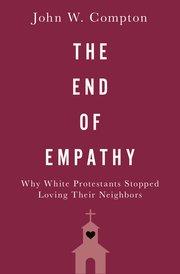

![]() The subtitle of the new book, The End of Empathy (Oxford University Press, $34.95), which asks “Why White Protestants Stopped Loving Their Neighbors,” is intended to provoke, but author John W. Compton has written a fairly nuanced historical study on the loss of Protestant social influence in America. Compton uses primary and secondary sources to document the continual weakening of American religious institutions that promoted concerns, leaving the field open to secular activism and “entrepreneurs of the religious right.” The political scientist opens the book with an account of the vitality of religious reform movements receiving wide support from mainline churches in the early 20th century on such issue as child labor, civil rights and other economic initiatives. Compton stresses that such social concern was not chiefly the province of only church and denominational leaders but rather these issues found remarkable resonance among rank-and-file church members. He argues that the strong institutional culture and authority of these churches and denominations strongly influenced its members’ social and political views and behavior.
The subtitle of the new book, The End of Empathy (Oxford University Press, $34.95), which asks “Why White Protestants Stopped Loving Their Neighbors,” is intended to provoke, but author John W. Compton has written a fairly nuanced historical study on the loss of Protestant social influence in America. Compton uses primary and secondary sources to document the continual weakening of American religious institutions that promoted concerns, leaving the field open to secular activism and “entrepreneurs of the religious right.” The political scientist opens the book with an account of the vitality of religious reform movements receiving wide support from mainline churches in the early 20th century on such issue as child labor, civil rights and other economic initiatives. Compton stresses that such social concern was not chiefly the province of only church and denominational leaders but rather these issues found remarkable resonance among rank-and-file church members. He argues that the strong institutional culture and authority of these churches and denominations strongly influenced its members’ social and political views and behavior.
The waning of such authority in the 1960s and 1970s under such forces as individualism and suburbanization (illustrated by an interesting account of the failure of mainline activism in the early 1960s on integration in California), led to the loss of a distinctly religious politics and the emergence of a situation where it is increasingly politics that determines religion rather than the other way around; even in mainline churches, most clergy are careful not to raise controversial issues in the fear of losing more members. Meanwhile, Compton writes that evangelicals lack the authority and infrastructure to shape their members’ minds on political and social issues. Thus, several attempts to revive liberal evangelical concern—such as immigration and environmental activism– has been largely an elite affair, with most members having little sympathy for such measures, as shown by the overwhelming support for Donald Trump in the 2016 elections. Compton concludes that “Left to their own devices, believers increasingly self-select into congregations populated by fellow partisans, and ministers increasingly mirror the ideological convictions of their congregants.”